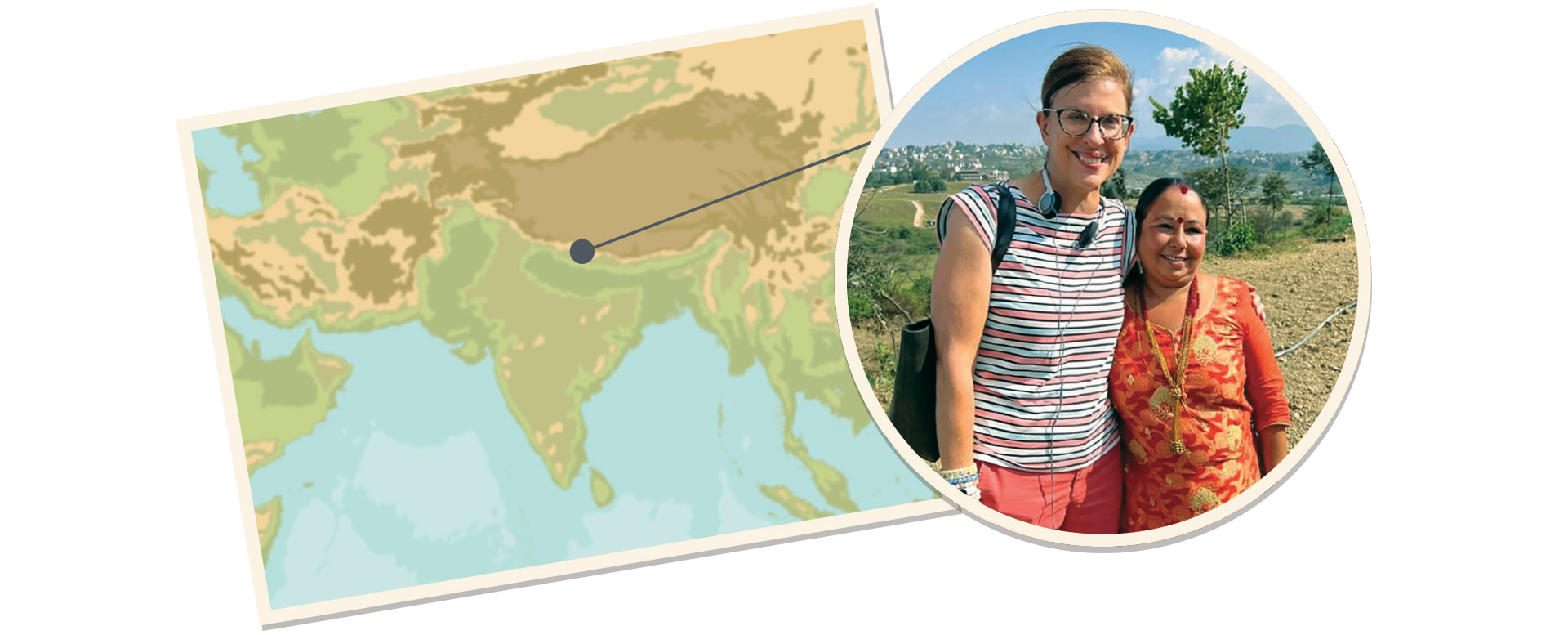alumni close-up
APPLYING SCIENCE
To Feed the Globe
alumni close-up
APPLYING SCIENCE
To Feed the Globe
BY JILLIAN ELLISON
On the eve of her flight to Nepal, Alexis Ellicott was reviewing her trusted travel checklist. She has carefully compiled it while spending over a decade abroad, leading several U.S. Agency for International Development (USAID) projects after earning her master’s degree in agronomy from the College of Agriculture.
“I’ve done this enough now that even though it’s stressful, it’s manageable,” Ellicott says. “I’ve moved for different USAID jobs so many times that the most arduous part is the length of the journey — and Nepal is very far away from the States.”
A life abroad is what Ellicott, who leads a USAID project to secure agricultural inputs for Nepal, dreamed of as a child, although she wasn’t sure how she would get there. After earning her bachelor’s degree in Russian language and literature from the University of Wisconsin in 1992, Ellicott studied in Russia. She stayed after her program finished, hoping that remaining abroad would help her find her passion.
Instead, she was reminded of another long-held dream to earn a science degree. She returned to her home state of Illinois and learned that since she already held a bachelor’s degree, she could fast-track a second one in biology at the University of Illinois, which she earned in 1997.
“I was still wondering what I could do internationally with science, given that I also had a passion for foreign languages,” she says. “I sort of triangulated that interest and came to the subject of international agriculture.”
She began interviewing in graduate programs at different universities. Her future in international agriculture became crystal clear upon meeting Gebisa Ejeta, distinguished professor of agronomy and Purdue University Presidential Fellow for Food Security and Sustainable Global Development. International activity taking place throughout the College of Agriculture helped Ellicott see how she could combine her desire to work around the globe with her interest in science.
As she worked toward her 2003 master’s degree in plant breeding and genetics, faculty members introduced her to government-funded programs aimed at solving global agricultural problems. Her multiple positions in programs led by USAID as well as other international development agencies have since taken her to West Africa, Bangladesh, Cambodia and most recently, Nepal.

Alexis Ellicott with
a vegetable farmer
in Kavre District in
central Nepal.
In Bangladesh Ellicott worked to identify women willing to become retailers in their communities for agricultural inputs like seed and fertilizer. USAID provided grant funding to launch their operations. Because this was a nontraditional role for Bangladeshi women, Ellicott anticipated the project would be a long, laborious process. By its end, however, USAID had awarded 300 grants to women around the country, and Ellicott was so inspired she wrote an opinion piece on the importance of supporting women in this segment of the economy for The Daily Star, Bangladesh’s largest circulation English newspaper.
“I remember when I saw the design for the project wondering, ‘How is this even going to work?’” Ellicott says. “We did a lot of grassroots work in communities identifying the level of support these women would have because, ultimately, we didn’t want to set people up with a business that we knew would fail. It was pretty painstaking, but it was amazing to see how the community rallied around women after we were able to ensure their concerns for them were being met.
“This entire project was about breaking down barriers, and this showed me that while there are still a lot of global barriers left to be broken down for women, nothing is impossible.”
Ellicott has found her dream career abroad, working to better the communities she temporarily calls home. She credits the timing and quality of her education.
“As I was coming out of my master’s, USAID was beginning to ramp up the Feed the Future initiative, and I fit the profile of what they were looking for, based on my Purdue degree,” she says. “My education allowed me to really see the bigger picture that’s needed for these programs to be successful.”

